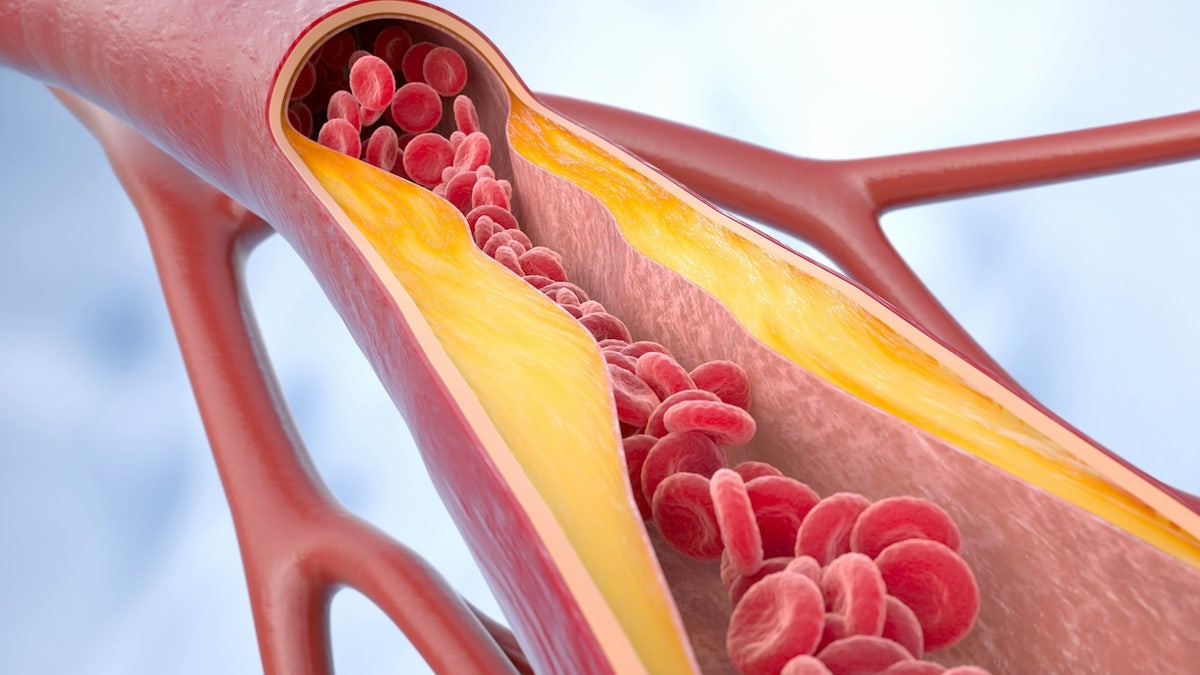Researchers have discovered an experimental medication that significantly reduces a cholesterol-like particle that can increase the risk of heart attacks and strokes.
Many Americans are unaware that elevated levels of this particle — known as lipoprotein(a) or Lp(a) — are circulating in their blood.
Elevated Lp(a) cannot be modified with lifestyle changes, and has been called “one of the last untreatable frontiers of cardiovascular risk” by Cleveland Clinic, who led the study.
LOW-CARB KETO DIET MAY NOT RAISE HEART DISEASE RISK, NEW STUDY SUGGESTS
This new research confirmed earlier findings showing that the experimental drug — lepodisiran, made by Eli Lilly, who funded the study — can “silence” the main gene responsible for synthesizing Lp(a).
(Other experimental gene therapies with a similar mechanism of action are also in development, according to Cleveland Clinic.)
Researchers have discovered an experimental medication that significantly reduces a cholesterol-like particle that can increase the risk of heart attacks and strokes. (iStock)
The findings were published in The New England Journal of Medicine and were also presented at the annual meeting of the American College of Cardiology on March 30.
What to know about Lp(a)
Lipoprotein(a) levels are elevated in approximately 20-25% of people worldwide, according to the American Heart Association.
This equates to approximately 64 million people in the U.S. and 1.4 billion people globally.
Lp(a) shares similarities with another lipoprotein that doctors target to reduce the risk of heart disease, known as low-density lipoprotein (LDL) – often referred to as “bad cholesterol.”
HEART DISEASE RISK HIGHER FOR WOMEN WHO HAVE THESE UNHEALTHY LIFESTYLE HABITS
But lipoprotein(a) is more prone to plaque buildup and clots in the arteries than LDL, according to lead author Steven Nissen, M.D., chief academic officer of the Heart, Vascular & Thoracic Institute at Cleveland Clinic.
“Lipoprotein(a) is an independent risk factor for heart disease that is largely determined by genetics — that is, it is inherited,” added Dr. Deepak L. Bhatt, director of Mount Sinai Fuster Heart Hospital and a professor of cardiovascular medicine at Icahn School of Medicine at Mount Sinai in New York, told Fox News Digital. (He was not part of the study.)

Lipoprotein(a) levels are elevated in approximately 20-25% of people worldwide, according to the American Heart Association. (iStock)
Lp(a) is primarily determined by differences in one gene, while LDL cholesterol levels are influenced by multiple genes.
“That’s a very big difference, and LDL has a much larger environmental component,” Nissen noted.
“Lp(a) is an independent risk factor for heart disease that is largely determined by genetics.”
Diet, exercise and weight loss can help decrease LDL levels, but they do not have an impact on Lp(a) levels, experts say.
And unlike LDL, which can be reduced with medications like statins, there are currently no approved drug treatments that lower Lp(a).
“There is no approved pharmacotherapy for lipoprotein(a) by regulatory authorities in any country in the world,” Nissen confirmed.
Study design
The researchers performed a clinical trial of 320 individuals from Argentina, China, Denmark, Germany, Japan, Mexico, the Netherlands, Romania, Spain and the U.S. from Nov. 11, 2022, to April 17, 2023.
The participants were randomly assigned to receive either a placebo or one or two subcutaneous injections of lepodisiran.

Diet, exercise and weight loss can help decrease LDL levels, but they do not have an impact on Lp(a) levels, experts say. (iStock)
The normal level of Lp(a) is less than 75 nanomoles per liter and the average level for people in the trial was about 250 nanomoles per liter, Nissen told Fox News Digital.
“They were very high — more than three times the upper limit of normal,” he added.
WHEN MEASURING HEART ATTACK RISK, ONE IMPORTANT RED FLAG IS OFTEN OVERLOOKED, DOCTORS SAY
After one injection of the highest dose, participants showed a nearly 100% reduction in levels of lipoprotein(a) at six months.
Those who received a second dose at six months maintained an almost 100% reduction at the one-year mark.
In other words, the therapy removed virtually all lipoprotein(a) from the blood, according to Nissen.

Unlike traditional cholesterol, which doctors typically monitor over time, lipoprotein(a) only needs to be checked once in a lifetime. (iStock)
Cardiologists say these findings may ultimately help treat millions of Americans who have elevated levels of Lp(a).
“The results are very impressive,” Bhatt said.
Potential limitations
The researchers noted that there were no major safety concerns, but 12% of participants reported mild reactions at the injection site.
The study had only a few Black participants — a population that needs more research, as they are more likely to have elevated lipoprotein(a) concentrations than White persons, according to previous studies.
(To address this concern, the researchers are enrolling many more Black patients in their larger phase 3 clinical trial.)
CLICK HERE TO GET THE FOX NEWS APP
Another limitation was that only two doses of lepodisiran were administered in the trial, so the effect of more doses is not known.
The study also did not show that reducing Lp(a) levels also reduces the risk of heart attacks and strokes, outside experts noted.

The European Society of Cardiology and the National Lipid Association in the U.S. both recommend that all adults check their Lp(a) levels. (iStock)
“A phase 3 trial testing the clinical impact of this drug is needed to see if the large reduction of Lp(a) translates into lower rates of heart attack,” Bhatt said.
Nissen confirmed that the phase 3 trial to address this question is already underway.
“Whatever your level is when you’re 24 years old is the level when you’re 64 years old – it doesn’t change, because it’s genetic.”
The European Society of Cardiology and the National Lipid Association in the U.S. both recommend that all adults check their Lp(a) levels.
CLICK HERE TO SIGN UP FOR OUR HEALTH NEWSLETTER
“I have been checking Lp(a) levels in all patients for many years,” Bhatt said.
But unlike traditional cholesterol, which doctors typically monitor over time, Nissen pointed out that lipoprotein(a) only needs to be checked once in a lifetime.
For more Health articles, visit www.foxnews.com/health
“Whatever your level is when you’re 24 years old is the level when you’re 64 years old – it doesn’t change, because it’s genetic,” he said.
“So you only need to get it once, and if you get it early in life, then you know you’re at risk, and you can live your life accordingly.”














































